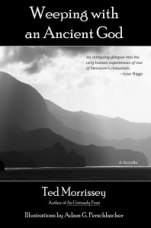 The Waxen Poor
The Waxen Poor
by J. D. Schraffenberger
In The Waxen Poor, J. D. Schraffenberger, associate professor of English at Northern Iowa University and associate editor of The North American Review, meditates on “Brother Tom,” apparently a semi-fictional version of his schizophrenic brother. The title of the collection comes from Leviticus 25:35: “And if thy brother be waxen poor, and fallen in decay with thee; then thou shalt relieve him: yea, though he be a stranger …” Schraffenberger explores this special obligation in skillfully crafted poems offering candid observations on the illness, brotherhood, and the parallels between “madness” and poetic creativity.
The poems in this book display grave equanimity in the face of nearly incomprehensible strangeness. It is not clear what one should make of the schizophrenic sibling. He is the loved brother and the paranoiac, the cheerful singer and messianic fanatic, playful child and deeply reticent young man. He both is, and is not, emotionally accessible. To exist in this way is
To be the living marker of one’s own death…
[…]
Is to say to any who’ll listen: Here lies Brother Tom
Of two minds / Lost or won / And writ as water / In the night.
On occasion these forward slashes appear within the lines, which are then both whole and fractured. This device is no mere gimmick as it is used sparingly an d effectively. An uneasy duality appears in other guises as well, most memorably in the conflation of different consciousnesses. “We restless brothers, we unlikely two, recline side by side /…/ Not knowing which one we will be tonight, Him or Me,” the poet writes in “Sleep and his Brother Death.” The boundaries between sanity and insanity, love and aversion, self and other are traversed often enough that they begin to disintegrate.
d effectively. An uneasy duality appears in other guises as well, most memorably in the conflation of different consciousnesses. “We restless brothers, we unlikely two, recline side by side /…/ Not knowing which one we will be tonight, Him or Me,” the poet writes in “Sleep and his Brother Death.” The boundaries between sanity and insanity, love and aversion, self and other are traversed often enough that they begin to disintegrate.
“Brother Tom” also refers to John Keats’s brother, Thomas, who died of tuberculosis. Keats probably contracted the disease from his brother, and the poet alludes vaguely to the idea of contagion: “I fear my brother’s illness,” he confesses in “To My Brother.” He “[muses] on the unseen meanings in things…on the significance of smoke in the sky…the uneasy rhyme of this with that.” Is there something dangerous, or paranoid, in the way random literary associations shape a poem? In “Song,” Schraffenberger navigates the moment at which a longing to communicate with his brother through innocuous, playful language degenerates into something bleak, as a sort of nursery rhyme takes on a more sinister tone:
O meek dirt eater, you bogus little biddy,
You shabby-chic la-di-doddler,
Come hum the tune with us…
[…]
Look, the haystack’s burning, the sheep’s unshorn.
The cow’s gone mad, the boy’s unborn.
O please won’t you sing or whistle at least?
There is risk in entering this world. Even the number 14 becomes troublingly significant. It is the age when Brother Tom had a major psychotic break, the number of years he lived, and also the number of lines in a sonnet. Schraffenberger’s sonnets stand out for their emotional acuity and unforced technical brilliance. The phrasing of “Errare” is hypnotic, tight and vivid, describing Brother Tom’s psychosis against the backdrop of rural Appalachia:
[…]
From the wander, the soy and cornfield wander,
To the barb and prick of wire fences rusted orange,
From the settling guiltless, cross-legged among the cows,
To the silent revelation of hoof and tail, mud and clay,
From the quiet coming of cops, hands hovering holsters,
To the rowdy ushering forth, the handcuffs and escort home,
You rise, brawling, all scrum and froth, all tooth and nail,
Into the heady realm of metaphysical fragility, where
Thought becomes thought becomes thought becomes true,
Where no one can change the dreaming / but you.
The alliteration and ellipsis in “hands hovering holsters” captures the breathless despair of the bystander and witness. In the last line, the forward slash again creates a fissure, curbing an increasingly manic meter and rhyme, pressing back as reality against dream.
Schraffenberger finds inspiration in nature as well as in literature and art history, from John William Waterhouse, Walt Whitman, W. C. Williams, and the Bible, at times reaching across millennia for the perfect image. For instance, he precisely conveys a confusing mix of fascination and alienation by likening an archaic sculpture of a young, heroic warrior to “Mean Tommy with a stink, baseball cap pulled low over the eyes / … here is your lost / Archaic smile—flat, unnatural, timelessly amused.” In this seamless fusion of classical and contemporary themes, the image is both marvelous and disturbing.
Whether in traditional or invented forms or prose poetry, the language of The Waxen Poor is always fluid without a jot of slack, perhaps reminiscent of the work of David Ferry or Tom Sleigh. The collection has a thematic kinship with Sherod Santos’s The Pilot Star Elegies, which also is haunted by the mental instability and death of a sibling. But where Santos offers an anguished, forthright analysis of his sister’s suicide, Schraffenberger’s poems evoke the subtle pain of estrangement with a steady hand and a fine chisel.
There is no pretense of perfect understanding, no bid for closure. In the final poem, Schraffenberger embraces an ongoing vigil, writing of his “brother, born for adversity,” “I’ll need to mourn him more carefully”—yet that would be hard to imagine.
July 2014, Twelve Winters Press
Poetry
$14.99, paperback, 63 pages
ISBN: 978-0989515153
—Reviewed by Vicky Albritton



